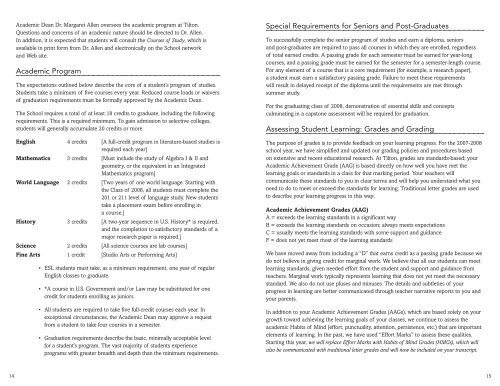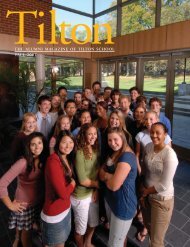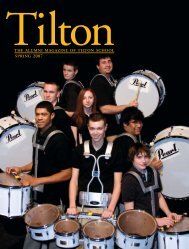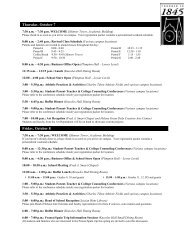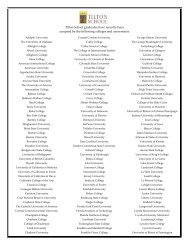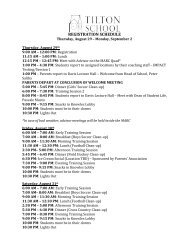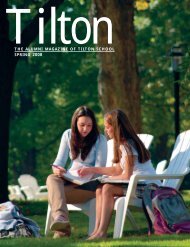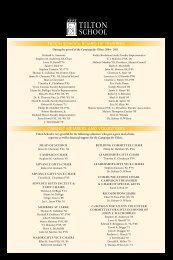the power of potential - Tilton School
the power of potential - Tilton School
the power of potential - Tilton School
You also want an ePaper? Increase the reach of your titles
YUMPU automatically turns print PDFs into web optimized ePapers that Google loves.
Academic Dean Dr. Margaret Allen oversees <strong>the</strong> academic program at <strong>Tilton</strong>.<br />
Questions and concerns <strong>of</strong> an academic nature should be directed to Dr. Allen.<br />
In addition, it is expected that students will consult <strong>the</strong> Courses <strong>of</strong> Study, which is<br />
available in print form from Dr. Allen and electronically on <strong>the</strong> <strong>School</strong> network<br />
and Web site.<br />
Academic Program<br />
The expectations outlined below describe <strong>the</strong> core <strong>of</strong> a student’s program <strong>of</strong> studies.<br />
Students take a minimum <strong>of</strong> five courses every year. Reduced course loads or waivers<br />
<strong>of</strong> graduation requirements must be formally approved by <strong>the</strong> Academic Dean.<br />
The <strong>School</strong> requires a total <strong>of</strong> at least 18 credits to graduate, including <strong>the</strong> following<br />
requirements. This is a required minimum. To gain admission to selective colleges,<br />
students will generally accumulate 20 credits or more.<br />
English 4 credits [A full-credit program in literature-based studies is<br />
required each year]<br />
Ma<strong>the</strong>matics 3 credits [Must include <strong>the</strong> study <strong>of</strong> Algebra I & II and<br />
geometry, or <strong>the</strong> equivalent in an Integrated<br />
Ma<strong>the</strong>matics program]<br />
World Language 2 credits [Two years <strong>of</strong> one world language. Starting with<br />
<strong>the</strong> Class <strong>of</strong> 2008, all students must complete <strong>the</strong><br />
201 or 211 level <strong>of</strong> language study. New students<br />
take a placement exam before enrolling in<br />
a course.]<br />
History 3 credits [A two-year sequence in U.S. History* is required,<br />
and <strong>the</strong> completion to satisfactory standards <strong>of</strong> a<br />
major research paper is required.]<br />
Science 2 credits [All science courses are lab courses]<br />
Fine Arts 1 credit [Studio Arts or Performing Arts]<br />
• ESL students must take, as a minimum requirement, one year <strong>of</strong> regular<br />
English classes to graduate.<br />
• *A course in U.S. Government and/or Law may be substituted for one<br />
credit for students enrolling as juniors.<br />
• All students are required to take five full-credit courses each year. In<br />
exceptional circumstances, <strong>the</strong> Academic Dean may approve a request<br />
from a student to take four courses in a semester.<br />
• Graduation requirements describe <strong>the</strong> basic, minimally acceptable level<br />
for a student’s program. The vast majority <strong>of</strong> students experience<br />
programs with greater breadth and depth than <strong>the</strong> minimum requirements.<br />
Special Requirements for Seniors and Post-Graduates<br />
To successfully complete <strong>the</strong> senior program <strong>of</strong> studies and earn a diploma, seniors<br />
and post-graduates are required to pass all courses in which <strong>the</strong>y are enrolled, regardless<br />
<strong>of</strong> total earned credits. A passing grade for each semester must be earned for year-long<br />
courses, and a passing grade must be earned for <strong>the</strong> semester for a semester-length course.<br />
For any element <strong>of</strong> a course that is a core requirement (for example, a research paper),<br />
a student must earn a satisfactory passing grade. Failure to meet <strong>the</strong>se requirements<br />
will result in delayed receipt <strong>of</strong> <strong>the</strong> diploma until <strong>the</strong> requirements are met through<br />
summer study.<br />
For <strong>the</strong> graduating class <strong>of</strong> 2008, demonstration <strong>of</strong> essential skills and concepts<br />
culminating in a capstone assessment will be required for graduation.<br />
Assessing Student Learning: Grades and Grading<br />
The purpose <strong>of</strong> grades is to provide feedback on your learning progress. For <strong>the</strong> 2007-2008<br />
school year, we have simplified and updated our grading policies and procedures based<br />
on extensive and recent educational research. At <strong>Tilton</strong>, grades are standards-based; your<br />
Academic Achievement Grade (AAG) is based directly on how well you have met <strong>the</strong><br />
learning goals or standards in a class for that marking period. Your teachers will<br />
communicate <strong>the</strong>se standards to you in clear terms and will help you understand what you<br />
need to do to meet or exceed <strong>the</strong> standards for learning. Traditional letter grades are used<br />
to describe your learning progress in this way;<br />
Academic Achievement Grades (AAG)<br />
A = exceeds <strong>the</strong> learning standards in a significant way<br />
B = exceeds <strong>the</strong> learning standards on occasion; always meets expectations<br />
C = usually meets <strong>the</strong> learning standards with some support and guidance<br />
F = does not yet meet most <strong>of</strong> <strong>the</strong> learning standards<br />
We have moved away from including a “D” that earns credit as a passing grade because we<br />
do not believe in giving credit for marginal work. We believe that all our students can meet<br />
learning standards, given needed effort from <strong>the</strong> student and support and guidance from<br />
teachers. Marginal work typically represents learning that does not yet meet <strong>the</strong> necessary<br />
standard. We also do not use pluses and minuses. The details and subtleties <strong>of</strong> your<br />
progress in learning are better communicated through teacher narrative reports to you and<br />
your parents.<br />
In addition to your Academic Achievement Grades (AAGs), which are based solely on your<br />
growth toward achieving <strong>the</strong> learning goals <strong>of</strong> your classes, we continue to assess <strong>the</strong><br />
academic Habits <strong>of</strong> Mind (effort, punctuality, attention, persistence, etc.) that are important<br />
elements <strong>of</strong> learning. In <strong>the</strong> past, we have used “Effort Marks” to assess <strong>the</strong>se qualities.<br />
Starting this year, we will replace Effort Marks with Habits <strong>of</strong> Mind Grades (HMGs), which will<br />
also be communicated with traditional letter grades and will now be included on your transcript.<br />
14<br />
15


